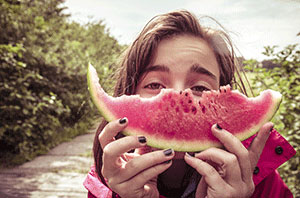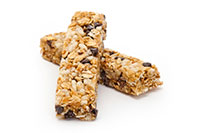Section navigation
Foods and drinks for physical activity

If you're active, you need fuel. But how much do you need, and when? Keep reading to learn more.
- Foods for working out
- What to drink during physical activity
- What about sports drinks, energy drinks, and vitamin waters?
Foods for working out  top
top
Everybody needs to eat a variety of healthy foods. But you may need to eat more if you are very active, like if you run several days each week or are on a sports team. That's because you need food to grow and to fuel all your activity. If you are very active but don't eat enough healthy food, your body may slow down and not work as well.
Confused about how much you need to eat? Use the MyPlate Checklist Calculator to find a personalized eating plan. You can look at the eating plans with a parent or guardian. In addition, you can get nutrition help from people like a doctor, school nurse, and nutritionist or dietitian. A coach or trainer also might be able to help. And you can learn more about healthy eating in our Nutrition section.
Wondering when to eat? Try not to eat a meal right before exercising, or you could get a stomach ache. It can take a few hours to digest a big meal. After a smaller meal, waiting around an hour should be fine. If you have several athletic events in one day (such as a few tennis matches), you can eat small snacks between events.
What about bars?
Energy bars can give you energy. But they can also give you hundreds of extra calories. (One bar can have as many calories as a small order of fries!) That may be fine for teens who often do things that burn a lot of calories, like going on long runs or playing on the soccer team. For some teens, though, energy bars may pack on too many pounds. Instead, try other on-the-go snacks, like air-popped popcorn, whole-grain cereal, a banana, low-fat cheese sticks, or unsalted nuts.

What to drink during physical activity  top
top
If you are active, you need to make sure to get enough water and other fluids. Getting too little fluids can mess up your memory, concentration, athletic ability, and more. Check out some helpful tips below.
Water works! It does a great job of replacing fluids you lose when you sweat, for example. How much do you need? That depends on lots of things, including how active you are and how hot it is.
Experts suggest drinking about a cup of water an hour or two before getting active. During your activity, try to drink around a cup every 15 or 20 minutes. Keep drinking water after the activity ends and sipping throughout the day.
You may need to drink even more if you are going to be working out very hard, such as in something like competitive soccer or cross-country running. You can ask your doctor, coach, or trainer for more information.
One way to tell if you're getting enough water is to check your urine (pee). It should be light yellow. If it's dark yellow, you probably need more water.
Don't wait until you feel thirsty. If you feel thirsty, you could be getting dehydrated. Being dehydrated means that your body does not have as much fluid as it should. It can be dangerous. Signs of dehydration include:
- A dry or sticky mouth
- Having less or darker urine
- Fast heart rate
- Feeling irritable or confused
- Feeling dizzy or weak
- Having a headache
If you have any of the symptoms above, tell an adult.
What about sports drinks, energy drinks, and vitamin waters?  top
top
Usually, water is all you need when you are active.
Sports drinks can help athletes when they are active for more than an hour doing an intense activity, such as running, biking, or playing basketball or soccer. That's because sports drinks (such as Gatorade) have sugars and salts you lose when you work out. If you don't exercise that much, it's best to avoid sports drinks because they have extra sugar and calories that may lead to cavities and weight gain.
Energy drinks are a bad idea for teens. For one, energy drinks often have a lot of caffeine. In fact, one energy drink could have as much caffeine as 14 cans of soda. What's wrong with caffeine? It can cause problems like increased blood pressure, trouble sleeping, and feeling nervous. It's also possible caffeine may block your body's use of calcium (which you need for strong bones). Plus, energy drinks can have things that are not good for your health, like lots of added sugar.
Vitamin waters or enhanced waters have extra vitamins and minerals. They may also be packed with extra calories, artificial sweeteners, caffeine, or ingredients that may not be safe for kids. The best way for you to get the nutrients you need is by eating a wide variety of healthy foods.
Content last reviewed March 27, 2015
Page last updated May 7, 2018







